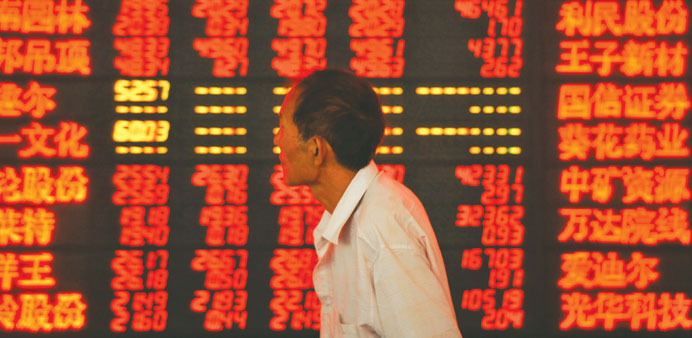An investor checks stock market prices at a securities firm in Fuyang. Shanghai shares closed up 4.92% yesterday as speculation of a broad overhaul of state-owned enterprises trumped weak economic figures released over the weekend, dealers said.
AFP/Tokyo
Asian shares mainly rose yesterday, led by a surge in China as hopes for more market intervention and state-backed mergers overshadowed fresh weak economic data from the world’s number two economy.
Meanwhile, the dollar gained against the yen after upbeat jobs data on Friday added to expectations the US central bank will raise interest rates as early as September. Tokyo equities scraped back earlier losses to close up 0.41% and Sydney added 0.63%.
Shanghai led the gains with shares closing up 4.92% on speculation the government will accelerate mergers between state-owned enterprises and release new funds to support the market.
“Though the economy as a whole is not performing quite well, it may lead to more loosening of monetary policy,” Zhang Qi, an analyst from Haitong Securities, told AFP.
“There might also be more state investment and reform of state-owned enterprises.”
Hong Kong clawed back early losses to end the day down 0.13%, while Seoul bucked the regional trend to close 0.35% lower.
In other markets, Bangkok dropped 0.61%, or 8.66 points, to 1,420.13; Airports of Thailand fell 2.41% to 284baht, while Siam Cement slid 1.15% to 516baht.
Kuala Lumpur fell 1.68%, or 28.28 points, to close on 1,654.37; Petronas Chemicals lost 4.30% to end at 6.01 ringgit, and Telekom Malaysia shed 2.88% to 6.41 ringgit.
Jakarta ended down 0.49%, or 21.35 points, at 4,748.95; financial services company Kresna Graha Investama gained 60% to 935 rupiah while air transport provider Indonesia Transport & Infrastructure fell 11.11% to 56 rupiah. Manila closed flat, adding 1.83 points to 7,534.35; Universal Robina Corp led gainers, rising 3.10% to 196.50 pesos, while top-traded Philippine Long Distance Telephone ended 1.96% down at 2,702pesos.
Taipei rose 0.29%, or 24.55 points, to 8,466.84; Taiwan Semiconductor Manufacturing Co shed 3.01% to Tw$129.0 while Fubon Financial Holding gained 2.11% to Tw$58.2.
In Wellington, the NZX-50 was flat, edging down 3.64 points to 5,865.02; Contact Energy rose 0.78% to NZ$5.19 while Auckland International Airport was down 3.05% at NZ$5.245
In Singapore markets were closed for a public holiday.
Beijing has unleashed unprecedented measures to support equities—including a crackdown on short-selling, suspension of new offerings and a ban on major shareholders selling their stakes—since the market collapsed in mid-July.
Stocks surged for a second day after China’s securities regulator late on Friday said it had called on brokers and fund managers to help stabilise the market.
Reports that Beijing plans to merge two major shipping companies, China Shipping Group and Cosco Group, also stirred speculation it could herald a shake- up of the country’s inefficient state-owned enterprises.
The news drove state-backed companies higher—China Shipbuilding Industry Co, China Coal Energy Co, and China United Network Communications all surged by the 10% daily limit.
Railway firms also gained. In Shanghai, China Railway Construction soared 9.49% to 18.34 yuan while China Railway Erju also climbed 8.31% to 17.07 yuan.
“State-owned enterprise mergers are an investment theme that’s quite certain and there are signs that the move will speed up,” Li Jingyuan, a general manager at Shanghai Zhaoyi Asset Management, told Bloomberg News. The gains came after trade data showing China’s exports plunged 8.3% from a year earlier, while imports dropped 8.1%, added to concerns over the health of Asia’s largest economy.
Beijing on Sunday said inflation rose 1.6% in July, well below the government’s annual target of three%, while producer prices declined to their lowest level since late 2009.
The news will likely hit commodities and particularly base metals, analysts said, which plumbed to multi-year lows last week over signs demand is waning in massive importer China.
Higher rates tend to push up the US currency, which in turn makes dollar-priced commodities less attractive to international investors and so dents prices.
Gold fetched $1,094.78, slightly higher than $1,089.64 late Friday and above last week’s nadir of $1,072.34 - its lowest level since February 2010.
But oil prices continued their decline, coming under pressure after reports of a rise in US rigs added to concerns of a supply glut, both globally and particularly in the world’s top crude consumer.
US benchmark West Texas Intermediate (WTI) for delivery in September fell to $43.76 a barrel from $43.87 in New York Friday. Brent North Sea crude for September traded at $48.50 a barrel, down from $48.61.
In currency markets, the dollar pushed higher after news the US added 215,000 jobs in July and unemployment held steady at a seven-year fuelled predictions the Federal Reserve could raise rates as early as September.
The greenback ticked up to ¥124.40 from ¥124.22 in New York on Friday. The euro edged higher to $1.0972 and ¥136.48, from $1.0962 and ¥136.16.

